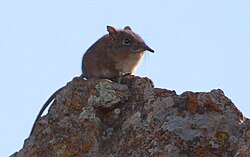| Eastern rock elephant shrew [1] | |
|---|---|
 | |
| On the rocky hill above Greylingstad, South Africa | |
| Scientific classification | |
| Kingdom: | Animalia |
| Phylum: | Chordata |
| Class: | Mammalia |
| Order: | Macroscelidea |
| Family: | Macroscelididae |
| Genus: | Elephantulus |
| Species: | E. myurus |
| Binomial name | |
| Elephantulus myurus Thomas & Schwann, 1906 | |
 | |
| Eastern Rock Elephant Shrew range | |
The eastern rock elephant shrew or eastern rock sengi (Elephantulus myurus) is a species of elephant shrew in the family Macroscelididae. It is found in Botswana, Mozambique, South Africa, and Zimbabwe. Its natural habitats are subtropical or tropical dry lowland grassland and rocky areas. [2]
